Abstract
1. This study was undertaken to gain more direct evidence of the pathways and neurochemical mediators of a spinally mediated baroreceptor inhibition of sympathetic preganglionic neurones (SPNs). 2. For this purpose, single-pulse electrical stimulation within identified vasodepressor regions of the nucleus tractus solitarii (NTS) was used together with extracellular recordings of single antidromically identified SPNs in the T2 segment of the spinal cord of anaesthetized rats. 3. The actions of agonists and antagonists of inhibitory amino acids on the NTS-induced inhibitions were determined, when they were iontophoretically applied in the vicinity of SPNs via a multibarrel micropipette assembly. 4. Extracellular recordings were made from sixty-nine SPNs. In forty-four SPNs, NTS stimulation elicited a period of inhibition of activity in both spontaneous and 'D,L-homocysteic acid-driven' SPNs with a latency to onset of 60 +/- 6 ms and a magnitude of 80 +/- 3%. 5. In six out of eight neurones, the NTS-induced inhibition was reduced by 74 +/- 16% during the application of the glycine antagonist strychnine (0-10 nA, 5-10 min) with doses that selectively blocked the inhibitory effect of iontophoretically applied glycine. 6. In nine out of nine neurones, the NTS-induced inhibition was reduced by 38 +/- 6% during the application of the GABAA antagonist bicuculline (5-15 nA, 4-14 min) with doses that selectively blocked the inhibitory effect of iontophoretically applied GABA. 7. In two SPNs, the actions of strychnine and bicuculline were shown to be additive in blocking the NTS inhibition. 8. The selective GABAB antagonists, CGP 35348 (20-50 nA, 6-25 min) and CGP 55845A (10 nA, 11 min) did not antagonize the NTS-induced inhibition. 9. It is suggested that GABA and glycine interneurones are activated by a baroreceptor bulbospinal pathway to inhibit sympathetic preganglionic neurones in the spinal cord.
Full text
PDF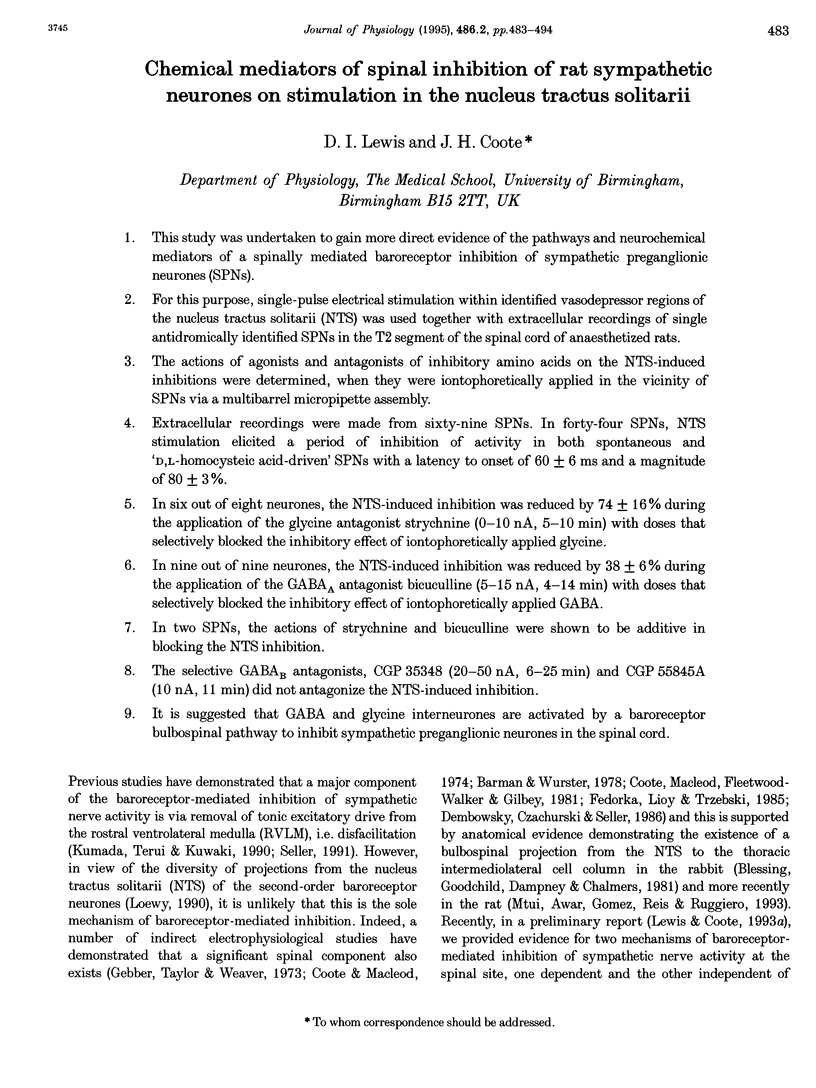
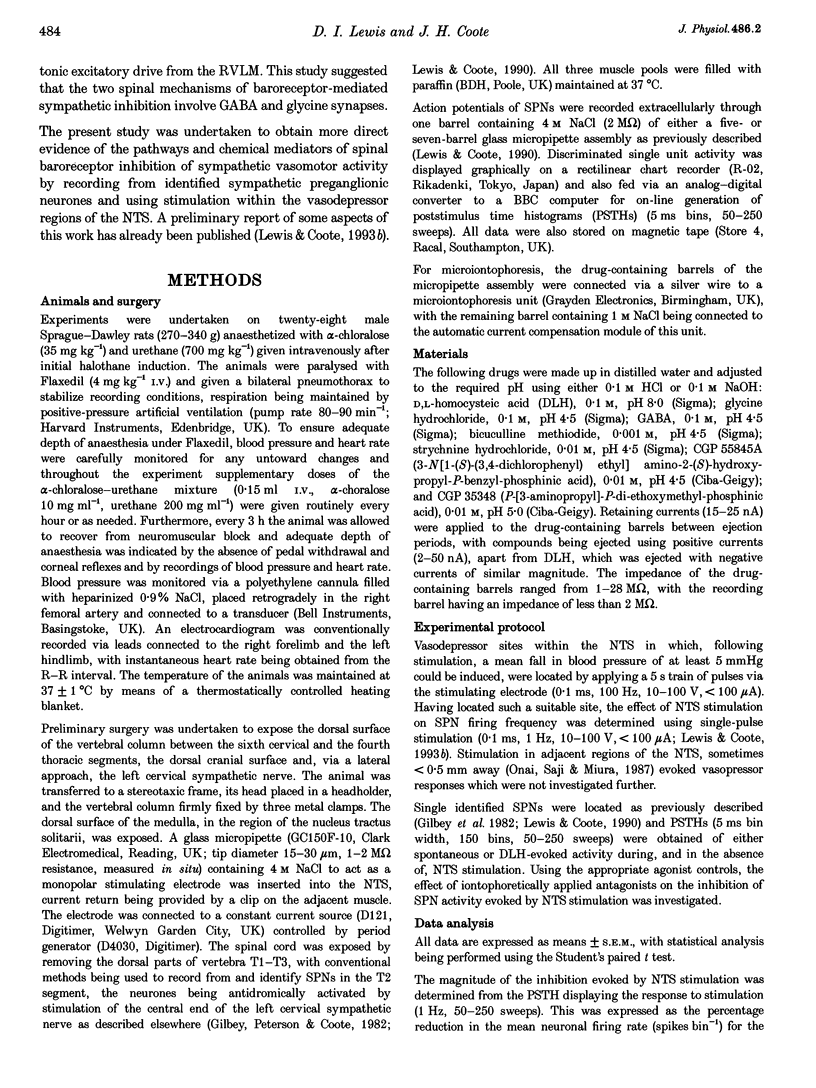
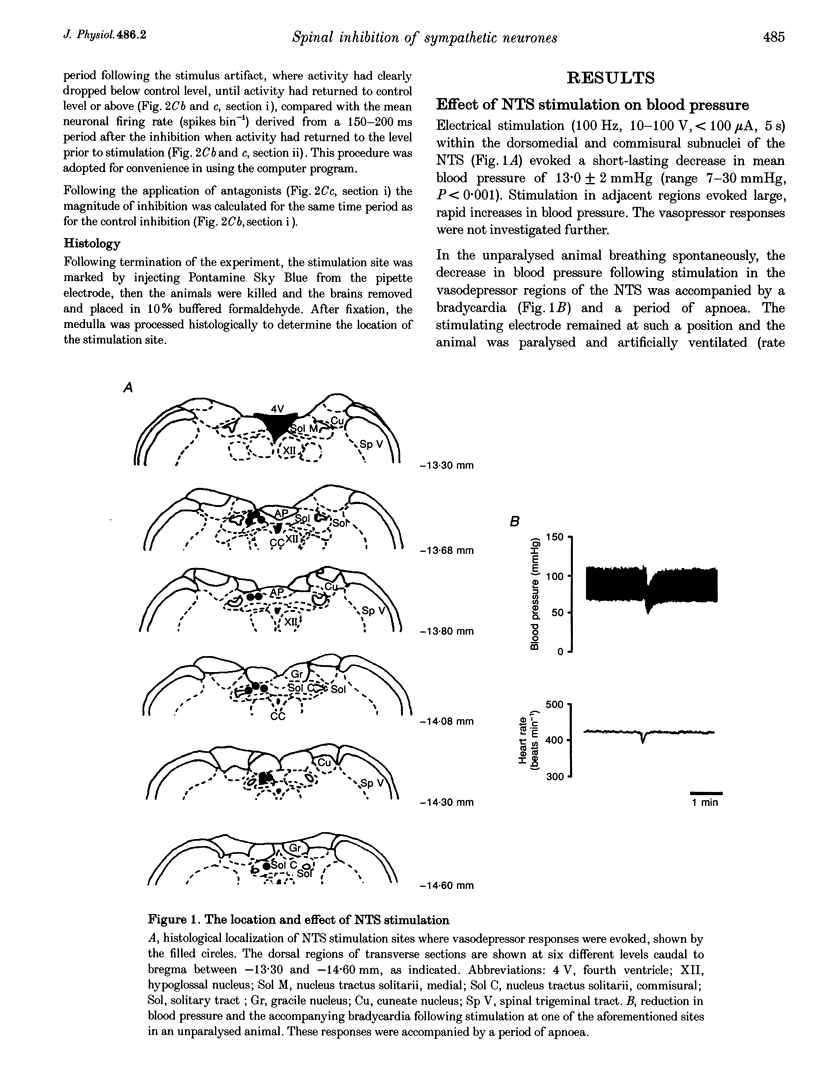
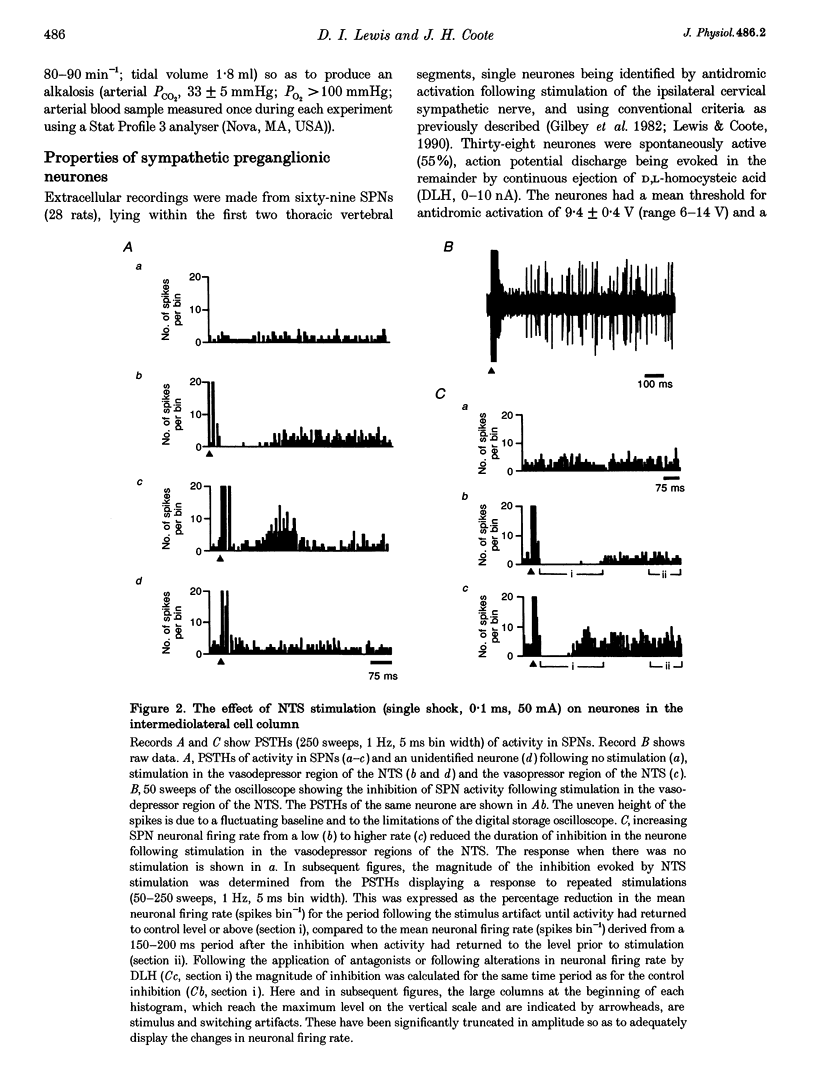
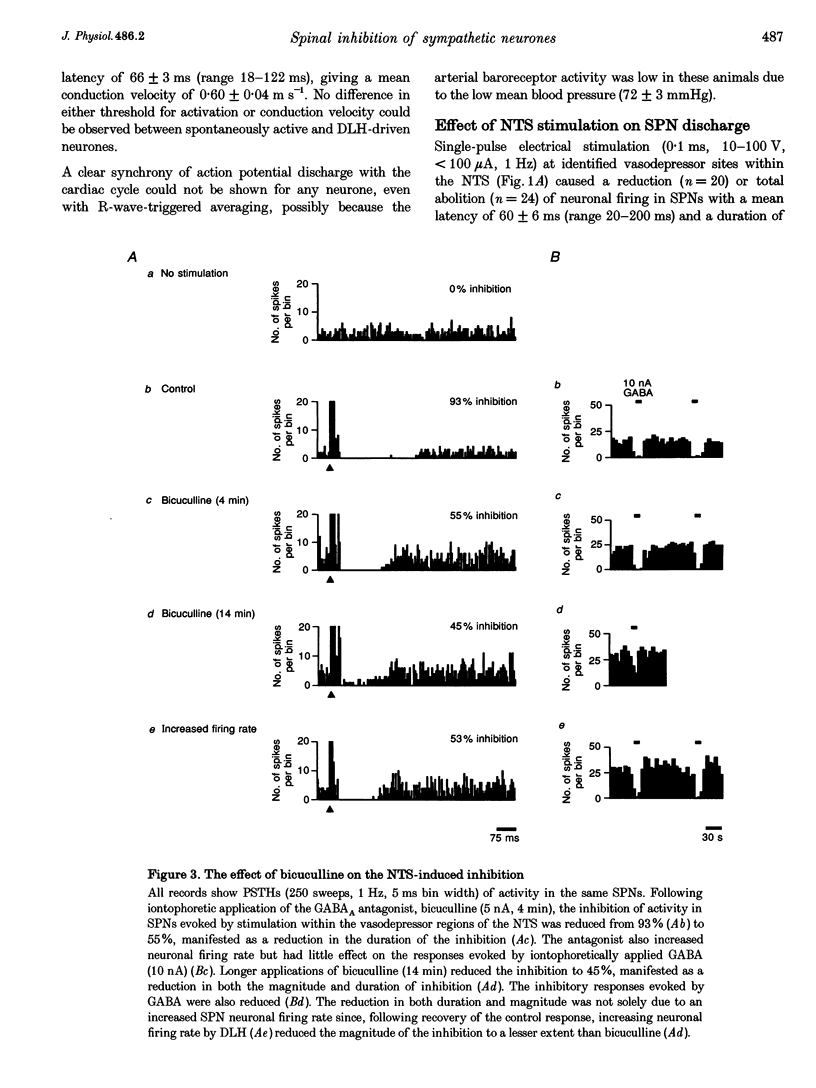
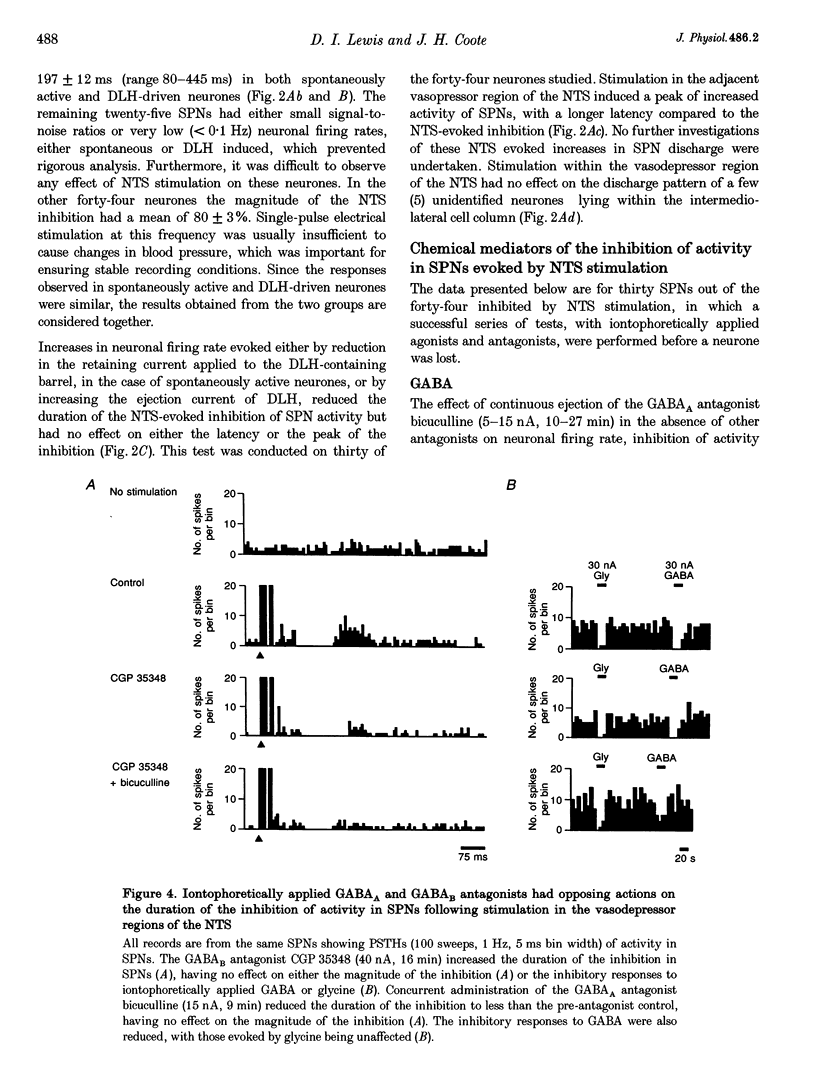
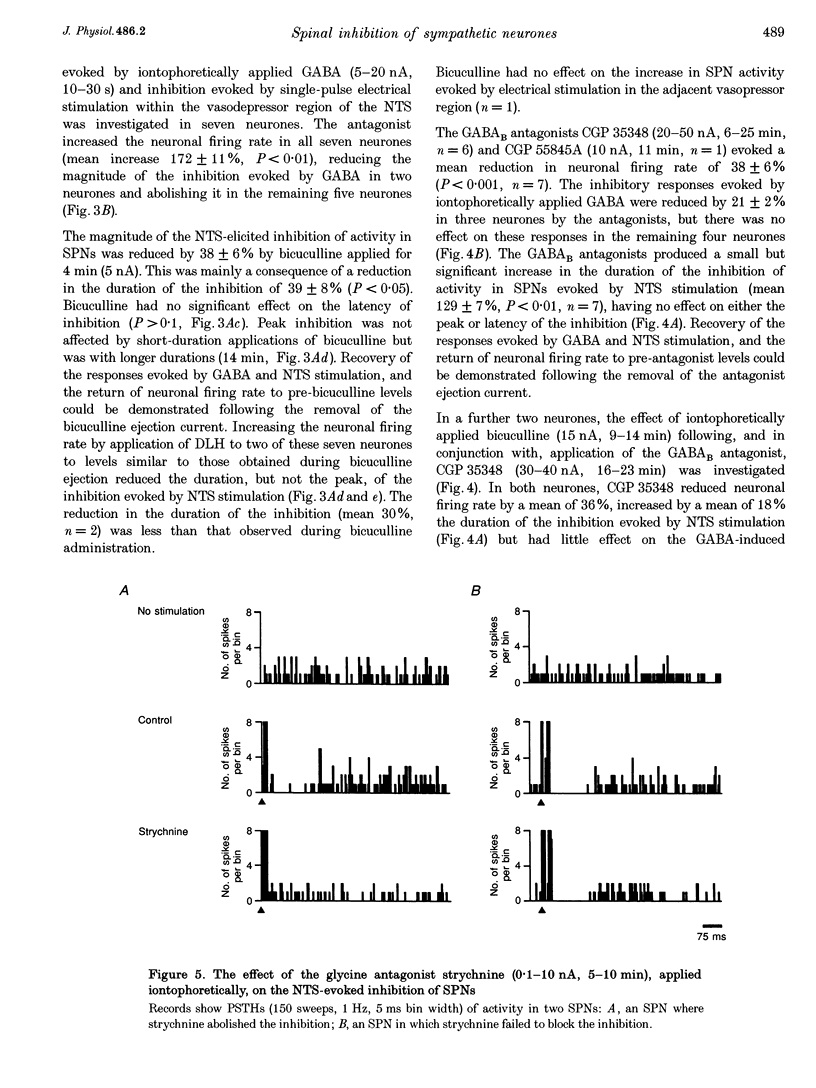
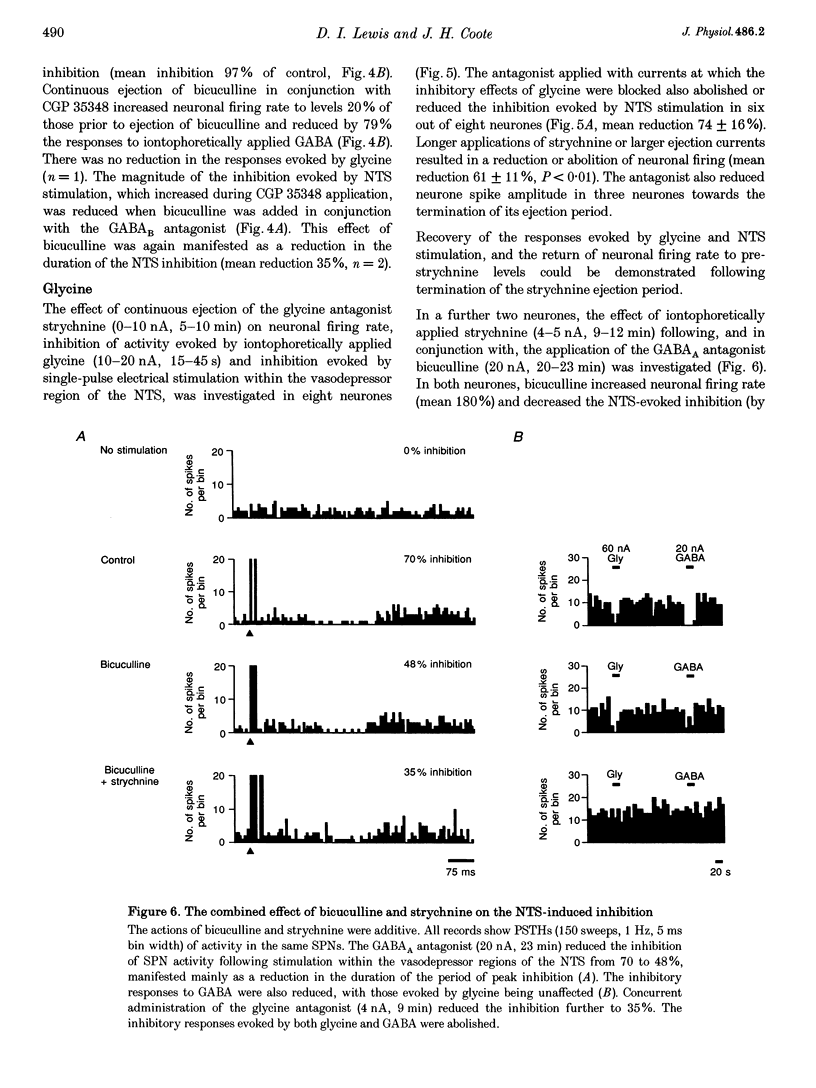
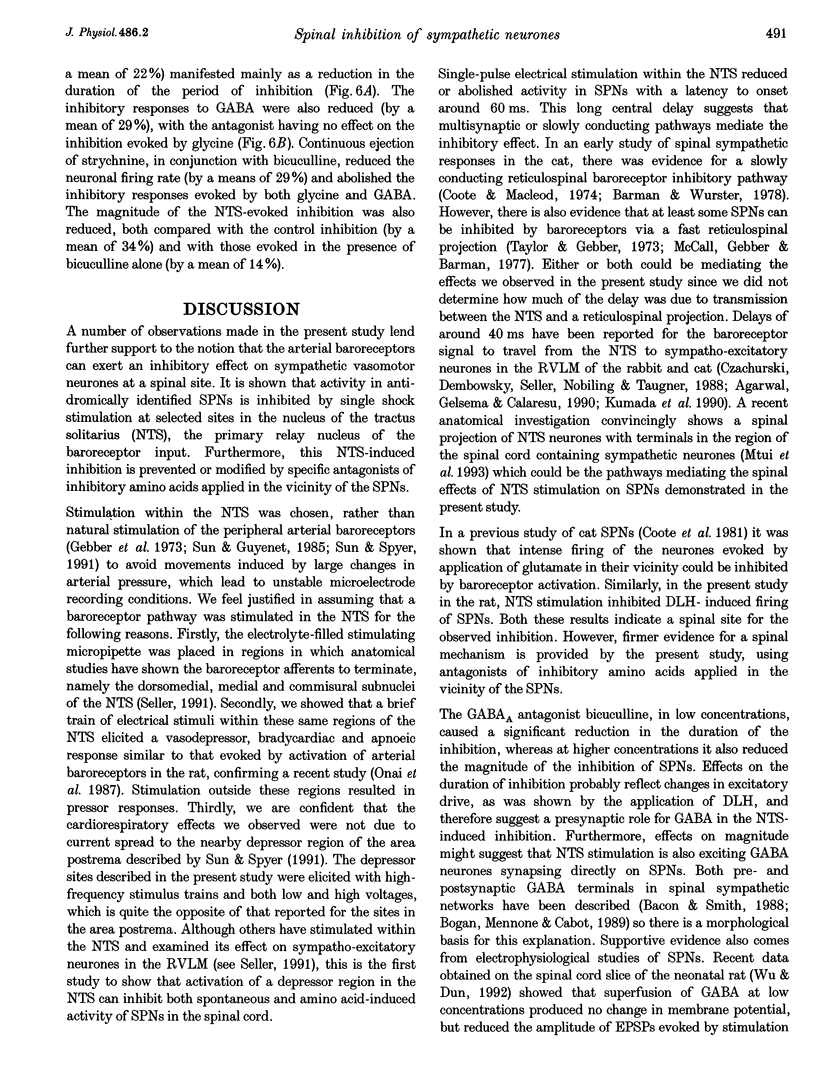
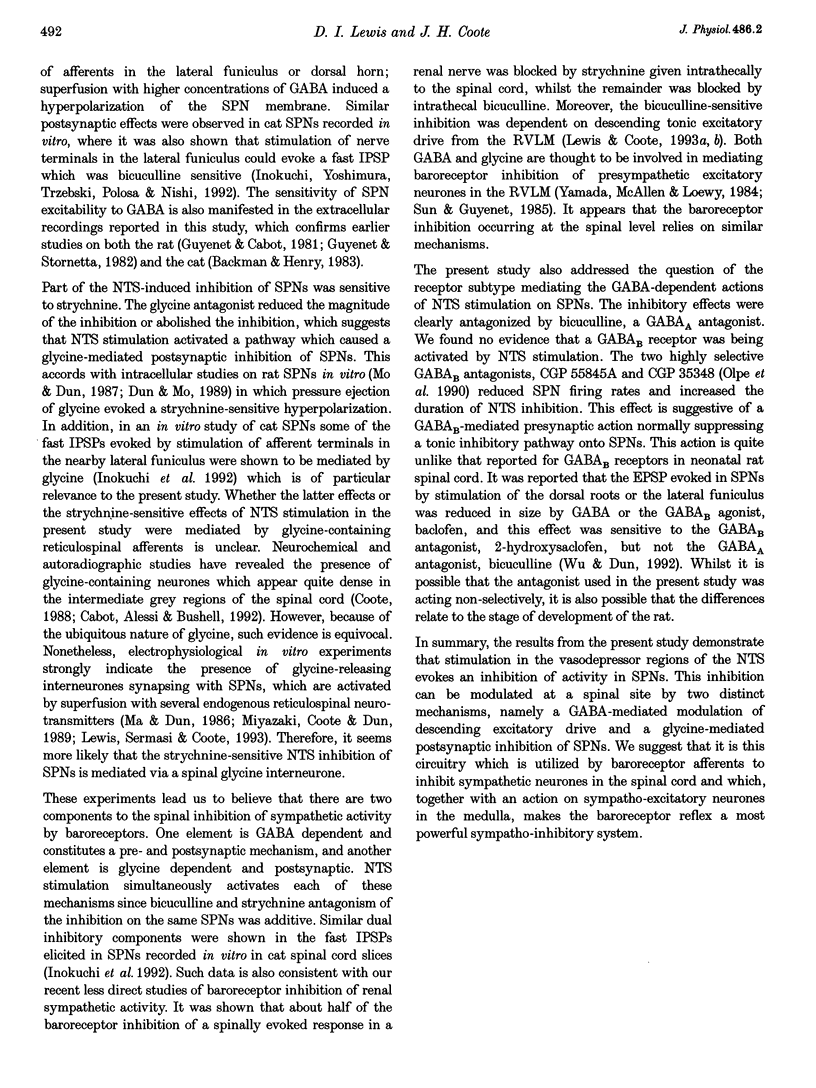
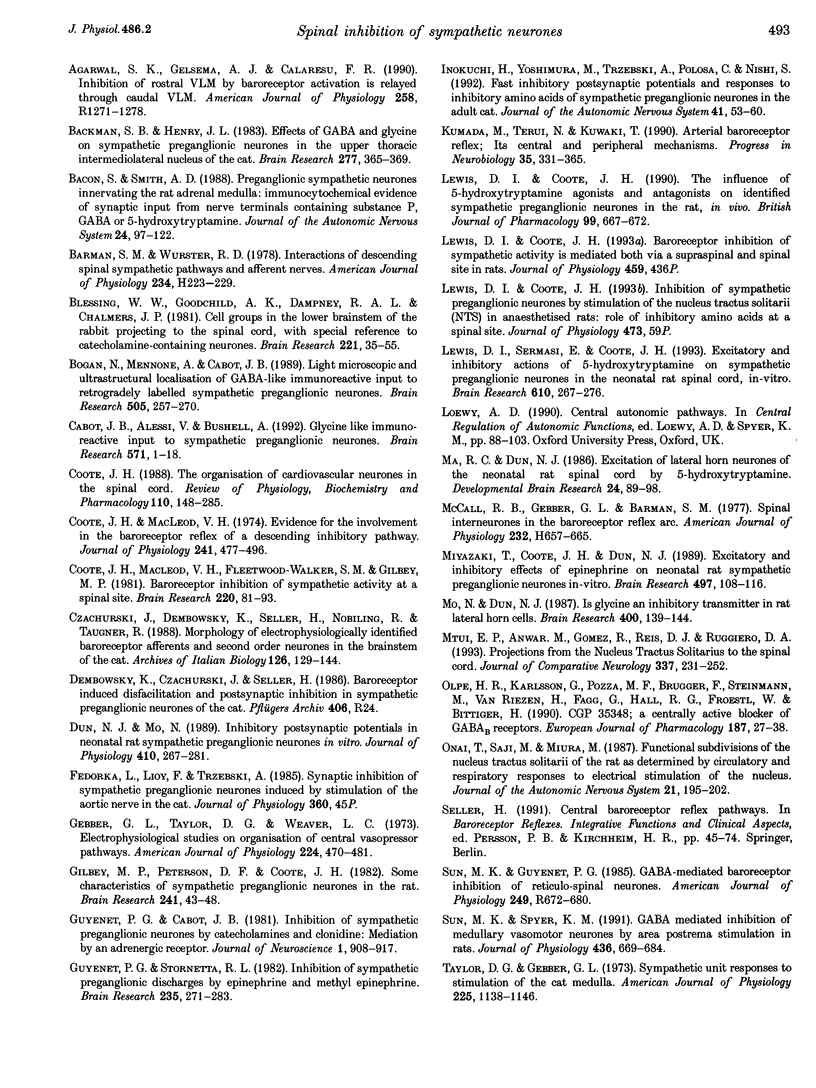
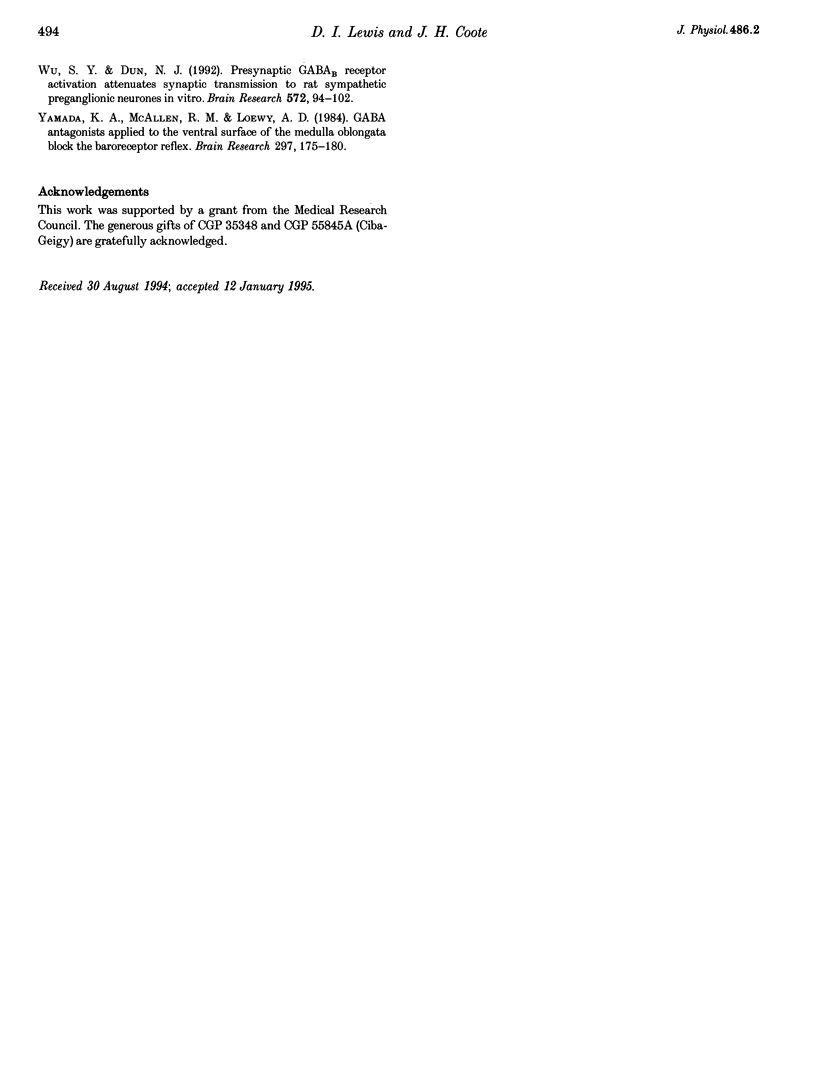
Selected References
These references are in PubMed. This may not be the complete list of references from this article.
- Agarwal S. K., Gelsema A. J., Calaresu F. R. Inhibition of rostral VLM by baroreceptor activation is relayed through caudal VLM. Am J Physiol. 1990 May;258(5 Pt 2):R1271–R1278. doi: 10.1152/ajpregu.1990.258.5.R1271. [DOI] [PubMed] [Google Scholar]
- Backman S. B., Henry J. L. Effects of GABA and glycine on sympathetic preganglionic neurons in the upper thoracic intermediolateral nucleus of the cat. Brain Res. 1983 Oct 31;277(2):365–369. doi: 10.1016/0006-8993(83)90947-2. [DOI] [PubMed] [Google Scholar]
- Bacon S. J., Smith A. D. Preganglionic sympathetic neurones innervating the rat adrenal medulla: immunocytochemical evidence of synaptic input from nerve terminals containing substance P, GABA or 5-hydroxytryptamine. J Auton Nerv Syst. 1988 Sep;24(1-2):97–122. doi: 10.1016/0165-1838(88)90140-3. [DOI] [PubMed] [Google Scholar]
- Barman S. M., Wurster R. D. Interaction of descending spinal sympathetic pathways and afferent nerves. Am J Physiol. 1978 Mar;234(3):H223–H229. doi: 10.1152/ajpheart.1978.234.3.H223. [DOI] [PubMed] [Google Scholar]
- Blessing W. W., Goodchild A. K., Dampney R. A., Chalmers J. P. Cell groups in the lower brain stem of the rabbit projecting to the spinal cord, with special reference to catecholamine-containing neurons. Brain Res. 1981 Sep 21;221(1):35–55. doi: 10.1016/0006-8993(81)91062-3. [DOI] [PubMed] [Google Scholar]
- Bogan N., Mennone A., Cabot J. B. Light microscopic and ultrastructural localization of GABA-like immunoreactive input to retrogradely labeled sympathetic preganglionic neurons. Brain Res. 1989 Dec 29;505(2):257–270. doi: 10.1016/0006-8993(89)91452-2. [DOI] [PubMed] [Google Scholar]
- Cabot J. B., Alessi V., Bushnell A. Glycine-like immunoreactive input to sympathetic preganglionic neurons. Brain Res. 1992 Jan 31;571(1):1–18. doi: 10.1016/0006-8993(92)90504-3. [DOI] [PubMed] [Google Scholar]
- Coote J. H., Macleod V. H. Evidence for the involvement in the baroreceptor reflex of a descending inhibitory pathway. J Physiol. 1974 Sep;241(2):477–496. doi: 10.1113/jphysiol.1974.sp010667. [DOI] [PMC free article] [PubMed] [Google Scholar]
- Coote J. H., Macleod V. H., Fleetwood-Walker S. M., Gilbey M. P. Baroreceptor inhibition of sympathetic activity at a spinal site. Brain Res. 1981 Sep 7;220(1):81–93. doi: 10.1016/0006-8993(81)90212-2. [DOI] [PubMed] [Google Scholar]
- Coote J. H. The organisation of cardiovascular neurons in the spinal cord. Rev Physiol Biochem Pharmacol. 1988;110:147–285. doi: 10.1007/BFb0027531. [DOI] [PubMed] [Google Scholar]
- Czachurski J., Dembowsky K., Seller H., Nobiling R., Taugner R. Morphology of electrophysiologically identified baroreceptor afferents and second order neurones in the brainstem of the cat. Arch Ital Biol. 1988 Jun;126(3):129–144. [PubMed] [Google Scholar]
- Dun N. J., Mo N. Inhibitory postsynaptic potentials in neonatal rat sympathetic preganglionic neurones in vitro. J Physiol. 1989 Mar;410:267–281. doi: 10.1113/jphysiol.1989.sp017532. [DOI] [PMC free article] [PubMed] [Google Scholar]
- Gebber G. L., Taylor D. G., Weaver L. C. Electrophysiological studies on organization of central vasopressor pathways. Am J Physiol. 1973 Feb;224(2):470–481. doi: 10.1152/ajplegacy.1973.224.2.470. [DOI] [PubMed] [Google Scholar]
- Gilbey M. P., Peterson D. F., Coote J. H. Some characteristics of sympathetic preganglionic neurones in the rat. Brain Res. 1982 Jun 3;241(1):43–48. doi: 10.1016/0006-8993(82)91226-4. [DOI] [PubMed] [Google Scholar]
- Guyenet P. G., Cabot J. B. Inhibition of sympathetic preganglionic neurons by catecholamines and clonidine: mediation by an alpha-adrenergic receptor. J Neurosci. 1981 Aug;1(8):908–917. doi: 10.1523/JNEUROSCI.01-08-00908.1981. [DOI] [PMC free article] [PubMed] [Google Scholar]
- Guyenet P. G., Stornetta R. L. Inhibition of sympathetic preganglionic discharges by epinephrine and and alpha-methylepinephrine. Brain Res. 1982 Mar 11;235(2):271–283. doi: 10.1016/0006-8993(82)91007-1. [DOI] [PubMed] [Google Scholar]
- Inokuchi H., Yoshimura M., Trzebski A., Polosa C., Nishi S. Fast inhibitory postsynaptic potentials and responses to inhibitory amino acids of sympathetic preganglionic neurons in the adult cat. J Auton Nerv Syst. 1992 Nov;41(1-2):53–59. doi: 10.1016/0165-1838(92)90126-2. [DOI] [PubMed] [Google Scholar]
- Kumada M., Terui N., Kuwaki T. Arterial baroreceptor reflex: its central and peripheral neural mechanisms. Prog Neurobiol. 1990;35(5):331–361. doi: 10.1016/0301-0082(90)90036-g. [DOI] [PubMed] [Google Scholar]
- Lewis D. I., Coote J. H. The influence of 5-hydroxytryptamine agonists and antagonists on identified sympathetic preganglionic neurones in the rat, in vivo. Br J Pharmacol. 1990 Apr;99(4):667–672. doi: 10.1111/j.1476-5381.1990.tb12987.x. [DOI] [PMC free article] [PubMed] [Google Scholar]
- Lewis D. I., Sermasi E., Coote J. H. Excitatory and indirect inhibitory actions of 5-hydroxytryptamine on sympathetic preganglionic neurones in the neonate rat spinal cord in vitro. Brain Res. 1993 May 7;610(2):267–275. doi: 10.1016/0006-8993(93)91410-t. [DOI] [PubMed] [Google Scholar]
- Ma R. C., Dun N. J. Excitation of lateral horn neurons of the neonatal rat spinal cord by 5-hydroxytryptamine. Brain Res. 1986 Jan;389(1-2):89–98. doi: 10.1016/0165-3806(86)90176-8. [DOI] [PubMed] [Google Scholar]
- McCall R. B., Gebber G. L., Barman S. M. Spinal interneurons in the baroreceptor reflex arc. Am J Physiol. 1977 Jun;232(6):H657–H665. doi: 10.1152/ajpheart.1977.232.6.H657. [DOI] [PubMed] [Google Scholar]
- Miyazaki T., Coote J. H., Dun N. J. Excitatory and inhibitory effects of epinephrine on neonatal rat sympathetic preganglionic neurons in vitro. Brain Res. 1989 Sep 11;497(1):108–116. doi: 10.1016/0006-8993(89)90976-1. [DOI] [PubMed] [Google Scholar]
- Mo N., Dun N. J. Is glycine an inhibitory transmitter in rat lateral horn cells? Brain Res. 1987 Jan 1;400(1):139–144. doi: 10.1016/0006-8993(87)90661-5. [DOI] [PubMed] [Google Scholar]
- Mtui E. P., Anwar M., Gomez R., Reis D. J., Ruggiero D. A. Projections from the nucleus tractus solitarii to the spinal cord. J Comp Neurol. 1993 Nov 8;337(2):231–252. doi: 10.1002/cne.903370205. [DOI] [PubMed] [Google Scholar]
- Olpe H. R., Karlsson G., Pozza M. F., Brugger F., Steinmann M., Van Riezen H., Fagg G., Hall R. G., Froestl W., Bittiger H. CGP 35348: a centrally active blocker of GABAB receptors. Eur J Pharmacol. 1990 Oct 2;187(1):27–38. doi: 10.1016/0014-2999(90)90337-6. [DOI] [PubMed] [Google Scholar]
- Onai T., Saji M., Miura M. Functional subdivisions of the nucleus tractus solitarii of the rat as determined by circulatory and respiratory responses to electrical stimulation of the nucleus. J Auton Nerv Syst. 1987 Dec;21(2-3):195–202. doi: 10.1016/0165-1838(87)90022-1. [DOI] [PubMed] [Google Scholar]
- Sun M. K., Spyer K. M. GABA-mediated inhibition of medullary vasomotor neurones by area postrema stimulation in rats. J Physiol. 1991 May;436:669–684. doi: 10.1113/jphysiol.1991.sp018572. [DOI] [PMC free article] [PubMed] [Google Scholar]
- Taylor D. G., Gebber G. L. Sympathetic unit responses to stimulation of cat medulla. Am J Physiol. 1973 Nov;225(5):1138–1146. doi: 10.1152/ajplegacy.1973.225.5.1138. [DOI] [PubMed] [Google Scholar]
- Wu S. Y., Dun N. J. Presynaptic GABAB receptor activation attenuates synaptic transmission to rat sympathetic preganglionic neurons in vitro. Brain Res. 1992 Feb 14;572(1-2):94–102. doi: 10.1016/0006-8993(92)90456-j. [DOI] [PubMed] [Google Scholar]
- Yamada K. A., McAllen R. M., Loewy A. D. GABA antagonists applied to the ventral surface of the medulla oblongata block the baroreceptor reflex. Brain Res. 1984 Apr 9;297(1):175–180. doi: 10.1016/0006-8993(84)90556-0. [DOI] [PubMed] [Google Scholar]


